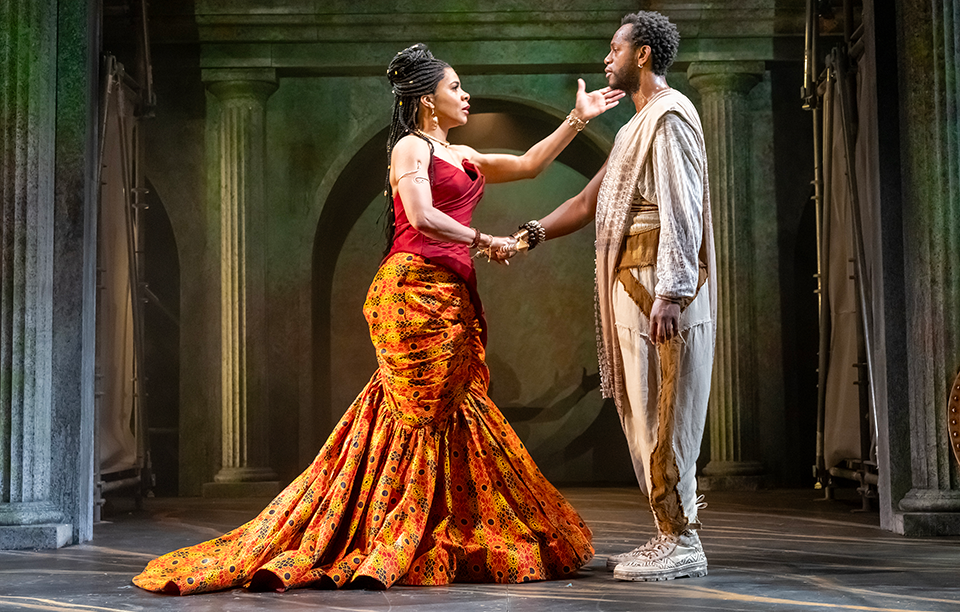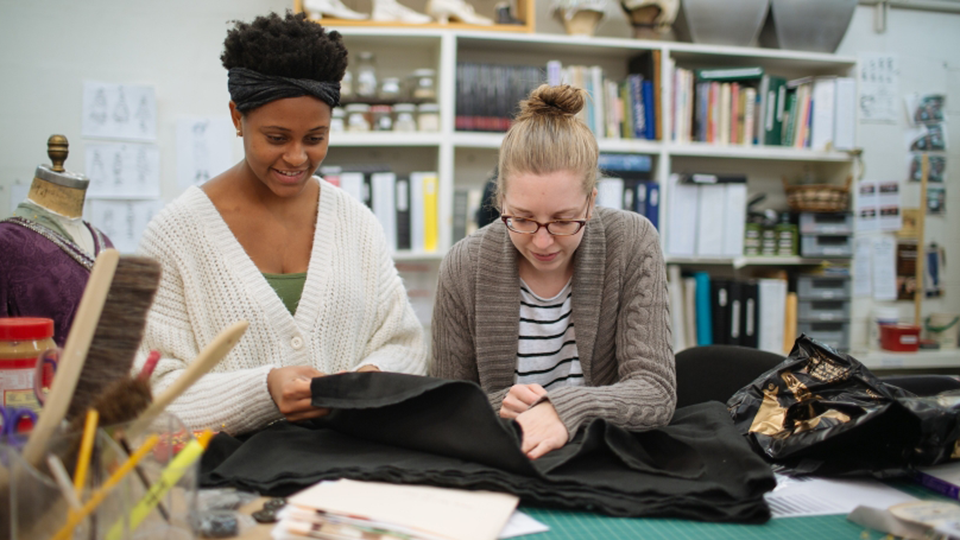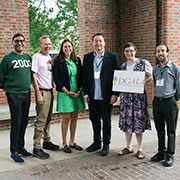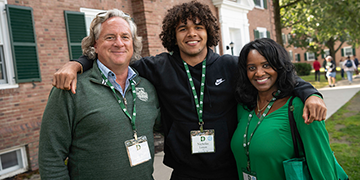Honoring Others Through Her Art
Playwright and costume designer Celeste Jennings reflects on family, the Hop, and the motivation behind her work.

Sep 8, 2025
8 minute read
8 minute read
Celeste Jennings ’18 discovered her passion for theater while at Dartmouth, further honed her skills in an NYU MFA program, and today is an in-demand artist committed to giving voice to people relegated to the margins of history.
She is both a playwright and costume designer—the two crafts inform one another, Jennings says—who layers respect for her forebearers and a sense of justice in her art.
“What really drives me is opening a history book or going through a museum exhibit and seeing photo captions that say, ‘Unidentified Black Woman’ or ‘Unknown Black Man, circa 1930,’” she says. “I want to make sure that the people in these photos have a story and that we know they impacted this world, whether on a large or small level, and that they were full, beautiful human beings.”
Most recently, Jennings designed costumes for the Classical Theatre of Harlem’s production of Memnon, a play by Will Power regaining lost African characters in Greek mythology, and the Arkansas Repertory Theatre’s production of James Baldwin’s The Amen Corner. She is now beginning to design Fun Home at the Huntington Theatre in Boston, which opens in November.
On the writing side of her professional ledger, she is developing her most ambitious project to date, Potliqka, a three-act play spanning 30 years in the Antebellum South.

Through it all, Jennings stays close to her Arkansas roots and the strength of family. She often writes plays that follow generations of family members, sometimes drawing on her upbringing to shape her characters.
“I feel blessed to have always been surrounded by elders. Most of my first cousins on my father’s side of the family are 20-something years older than me, and my dad is one of 14,” she says. “On my mom’s side, my granny was the oldest daughter of 13. So, I’ve always been a part of this huge, bustling, beautiful family with deep roots in the South. My parents and the entire family made sure we kids understood our history.”
Becoming a theater artist at Dartmouth
Jennings arrived at Dartmouth with notions of becoming a fashion designer. She discovered the costume shop in the Hopkins Center for the Arts during her first year and still remembers when Shop Manager Jennifer Bilbo walked her through the facility for the first time.
“I couldn't believe what was in front of me because it didn’t feel like fashion. It was so much deeper than that,” she says. “I tentatively signed up to be a volunteer one day a week for a few weeks, and almost immediately I said, ‘No, I want to work here. Please. I want to come every day.’ The Hop soon felt like my home at Dartmouth. I learned how to be a theater artist there.
Over the next four years, Jennings says she met many people who assumed she was a theater major. In fact, she took only two or three theater classes.
“It’s amazing how much love the theater department poured into me when they didn’t have to,” she says. The entire Hopkins Center costume shop staff embraced her. Associate Professor of Drama Laurie Churba “taught me everything I know,” she says. Kathy Perkins, a lighting designer and visiting professor from the University of North Carolina, “took me under her wing and shared so much advice. For my first three years out of Dartmouth, I think I asked her to review every contract I received.”
Churba says Jennings was hungry to excel at both facets of costume design—the creativity and the technical aspects, which encompass sewing, draping, and tailoring.
“Celeste was very green when she first started in my class, but most of the students are. She just had great instincts and was able to really play on them. She always had a tremendous amount of talent in costume design. She just needed to figure out how to get into the groove of it,” Churba says. She adds that in more than 30 years of working in theater, she hasn’t ever met another artist proficient as a playwright and costume designer.
“That combination is incredibly rare,” she says. “Celeste is a strong poet. When she came into our costume shop, she talked about the slam poetry that she’d been writing. It was another way she expressed herself. When she found us, it all came together. She discovered that she could take her slam poetry and combine it with art and sewing and have a career. That was exciting for her.”
Jennings began writing the play Citrus as a senior fellowship project. The choreopoem, a production combining dance, poetry, and song, honors generations of Black women by telling their stories from the 1840s to the present day. Citrus was first performed at the Hop, and Northern Stage in White River Junction produced the play two years later, unfortunately just as the pandemic started shutting down theaters across the globe.

Her other completed plays include Processing, focusing on the often-interwoven misery of prejudice against immigrants and economic uncertainty; ’Bov Water, tracing a family’s journey from the end of the Civil War through the 1960s; Contentious Woman, exploring the history of southern plantations, the promise of emancipation, and the anguish of Jim Crow through the story of five Black women working in a tobacco factory; and WJLB, presenting a story inspired by the first Black-founded and owned radio station in the U.S. and its struggle to survive in the 1970s.
In 2023, just as she completed her MFA in costume design at NYU’s Tisch School of the Arts, Jennings was one of six emerging writers named 2050 Artistic Fellows by the New York Theater Workshop. In addition to meeting with one another monthly to discuss their craft, each fellow received funding to support their writing. Jennings used a portion of her award to visit Ghana as part of her research that led to Potliqka.
“It was one of the most transformative things I’ve ever done,” Jennings says. She took a deep dive into Ghanian cooking to expand her understanding of how African American cuisine evolved, and she visited what are known as “slave castles” in Ghana—Jennings refers to them as dungeons—where thousands of Africans were held in horrendous underground chambers before boarding ships to become slaves in Europe or North America. “It’s hard for me to articulate how visiting those spaces transformed my mind, body, and soul. I had never experienced returning to Mother Africa and being embraced and welcomed by my diasporic family. I left Ghana with my heart and soul more equipped than ever to explore my ancestors’ stories. I feel compelled, obligated, and grateful for the responsibility as an artist.”
Jennings followed that by joining the Public Theater’s Emerging Writers Group. Over two years, she honed her writing skills and shared drafts with nine other young playwrights. The conclusion of the program was “both scary and bittersweet,” she says, but the experience enabled her to complete a first draft of Potliqka and gave her a network of trusted colleagues.
Finding balances
While writing plays and designing costumes may seem like disparate elements of theater production, Jennings says the two fuel each other, and there are similarities: Both require extensive research—“The research ignites everything,” she says—and revisions take place right up to opening night.
“I love them equally. I am trying hard to find balance these days, and I feel like this might be a lifelong struggle for me in the arts. Being a freelance artist is such a roller coaster. Every day is completely different than the day before, and the projects come and go,” she says. “However, every time I work on a show as a costume designer, I’m getting stronger as a writer, and vice versa.”
Jennings has already lined up three major design jobs for 2026, meaning she must juggle multiple deadlines and still set aside time to write. Fortunately, New York’s Rattlestick Theater recently named her a Terrence McNally New Works Incubator fellow. The two-month fellowship will enable her to continue focusing on Potliqka, her three-and-a-half-hour epic that begins with James Hemings, a French-trained chef and slave owned by Thomas Jefferson.
“The story isn’t just about enslaved Black Americans. It delves into what freedom means to people who technically have it versus people who don’t,” Jennings says. “The play tracks 20 people entwined in three journeys, taking them to places such as Arkansas, Baltimore, France, and Liberia. It’s about people seeking freedom and love, all told through the perspective of soul food and cooking.”
Finding the right mix of costume design and playwriting work isn’t her only balancing act. There is the ongoing challenge of being commercially successful while writing about topics and themes closest to her heart. One pending task exemplifies that challenge: her goal to cut 30 minutes from Potliqka.
“Pursuing a career in the arts is a crazy risk. It’s not safe,” she says. “But I feel it’s my honor and responsibility to pay homage to all the people who helped raise me, whether or not they’re still living or whether I ever knew them. I want to memorialize the people in my family who may have dreamed about being an artist but took X, Y, or Z job to pay the bills. Because of them, I get to be an artist.
“I don’t know how to write something without being emotionally attached to it,” she adds. “I like to use the names of my ancestors in my plays. I like to include the ground they walked on. If I’m not emotionally invested in the work, then I don’t know if that’s the play I should be writing.”






